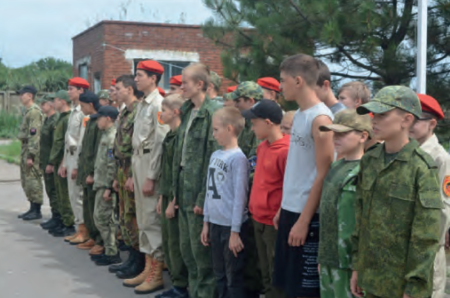Source > People and Nature blog
“The Kremlin intends to bring up a generation hostile to Ukraine and its people, making it always possible to provoke social-political conflicts, that can grown over into military ones”, concludes the report by the Eastern Human Rights Group.
The report, “Militarisation of Children in Occupied Donbass”,[1] details the clubs’ activity in the Donetsk and Luhansk “people’s republics”, in the year leading up to Russia’s full scale invasion of Ukraine in February.
The Young Guard Youth Army (Molodaya gvardiya Yunarmiya) is the largest such club, with 5000 members in Luhansk. The Donetsk Youth Army claims a membership of 2500, between the ages of 8 and 35, grouped in more than 100 local organisations.
The Youth Army’s activities include: survival training in extreme conditions; field exercises including orienteering; physical training; arms training; and military tactics.
In both Donetsk and Luhansk, the Youth Army and other clubs were set up on the authorities’ initiative. In Luhansk, they are supplemented by cadet classes and corps in schools, in which more than 1600 children were registered as of December last year. Their curriculum includes physical and military training.
According to the ideology that pervades schools in the Donetsk and Luhansk “republics”, Donbass is part of the “Russian world”; Ukrainians are the “fascist” enemy.
Hero status is accorded to fighters in the irregular units that established the “republics”. In Luhansk, a Special Centre for Pre-Conscription Youth (i.e. the under-18s) has been named after Oleg Grishin, a platoon commander killed in battle in July 2014, three months after the “republic” was founded.
Donetsk schoolchildren are taken to visit a museum whose “Avenue of Heroes” features such leaders of the lawless “republic” as Aleksandr Zakharchenko and Mykhailo Givi, killed by bomb blasts in 2018 and 2017 respectively – unsolved killings, blamed by the Donetsk authorities on Ukraine, that may have been organised from Russia.
□ Representatives of the Eastern Human Rights Group, that published the report, will address an online meeting, on Thursday 14 July, at 6.0pm UK time / 7.0pm European time, organised by the European Network for Solidarity with Ukraine. (The meeting is open to all. There are more details and a link to register here.)

The EHRG was set up in July 2014 by trade union activists, and has since then monitored human rights abuses on both sides of the front line between Russian-occupied and government-controlled areas. It has established a legal support network for workplace labour organisers.
Since the all-out invasion of Ukraine in February, the EHRG has supported citizens victimised by forcible mobilisation and deportation in the “republics”.
Thursday’s call is the second of two. The first, with representatives of other human rights organisations, was held on Monday 4 July and can be viewed on line here. Oleksandr Kliuzhev, one of the speakers on that call, said that one of the most tangible forms of resistance currently is the refusal of local officials to cooperate with the Russian army.
□ The indoctrination techniques developed in the “republics” are modelled on those established in Crimea, the Kharkhiv Human Rights Protection Group has pointed out.
In February, just prior to Russia’s all-out invasion of Ukraine, Youth Army membership in Crimea had reached 29,000, organised in 874 units. The Youth Army members go to open days at military bases. A “school of future commanders” is organised at the Artek children’s centre.
The Kharkhiv group pointed out that the Geneva convention states (Article 51) that occuping powers may not compel people to serve in the armed forces, and adds: “No pressure or propaganda which aims at securing voluntary enlistment is permitted.”
This is why NGOs argue that the organisation of the Youth Army, with its focus on military activity and Russian patriotism, is a war crime.
The Organisation for Security and Cooperation in Europe reports “allegations that the Russian Federation is considering recruiting, for the purpose of military deployment in Ukraine, boys under 18 years old, from Russia and possibly also from Crimea”, in its report on war crimes and human rights law violations in Ukraine between 24 February and 12 April this year (see here, page 79). SP, 12 July 2022.
The Anti*Capitalist Resistance Editorial Board may not always agree with all of the content we repost but feel it is important to give left voices a platform and develop a space for comradely debate and disagreement.
Art Book Review Books Campism Capitalism China Climate Emergency Conservative Government Conservative Party COVID-19 Creeping Fascism Economics EcoSocialism Elections Europe Far-Right Fascism Film Film Review Fourth International France Gaza History Imperialism Iran Israel Italy Keir Starmer Labour Party Long Read Marxism Marxist Theory Migrants Palestine pandemic Police Protest Russia Solidarity Statement Trade Unionism Ukraine United States of America War Women

